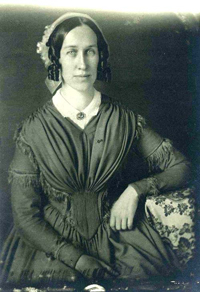In the years before the Civil War, Kansas was a battleground. As Free State forces clashed with pro-slavery marauders from Missouri, a 40-something mother of four from Vermont waged a war of her own. As “Bleeding Kansas” raged around her, Clarina Howard Nichols came into her own as a champion of equal rights for women and blacks.
A new biography tells the story of this often-overlooked reformer and her contributions to social justice in 19th century America.
In Frontier Feminist: Clarina Howard Nichols and the Politics of Motherhood, Marilyn S. Blackwell and Kristen Tegtmeier Oertel provide an accessible, deeply researched, and often thrilling study of Nichols’ life and achievements.
For one of its authors, the book represents a homecoming long in the making.
An associate professor of 19th century American history at the University of Tulsa, Dr. Oertel first became enamored with history during her junior year of high school at Shawnee Mission North in Overland Park, Kansas. Growing up at a time before women’s studies was prevalent in the educational system, Oertel didn’t learn of her Kansas forebear until years after she left home. She was working on her master’s thesis at SUNY-Binghampton when she first became aware of Nichols.
“When I discovered that she was responsible for passing school suffrage so that women in Kansas could vote on their school board before anywhere else in the country, I was shocked,” Oertel remembers. “I couldn’t understand why I hadn’t heard of her before.”

Dr. Kristen Tegtmeier Oertel
Now as co-author of the first scholarly biography of Clarina Howard Nichols, Oertel can ensure that future generations of Kansans won’t miss out on the remarkable legacy of one of the state’s most progressive figures.
Using the impact of Nichols’ ill-fated first marriage as a springboard, Oertel and Blackwell trace Nichols’ entire activist arc – from cutting her teeth as a newspaper editor in Vermont; through her years as a traveling speaker and pioneer of progressivism in her adopted state of Kansas; to her final days in California.
Though a formidable journalist and accomplished lecturer in her time, Nichols is not as well-remembered today as her contemporaries and friends such as Susan B. Anthony, Elizabeth Cady Stanton, and Lucy Stone. At least, not outside of Kansas.
Following the Kansas-Nebraska Act of 1854, Nichols, then 44 and remarried, led her family in joining thousands of other anti-slavery emigrants from the east who hoped to build a “new oasis of freedom” in Kansas. She moved first to Lawrence, then, three years later, to Wyandotte County.
Nichols’ return to prominence has been many years in the making.
In the 1970s, Kansas archivist Joseph Gambone edited Nichols’ papers, dubbing her “The Forgotten Feminist of Kansas.” More recently, Kansas City-based writer Diane Eckhoff revived interest in Nichols with her 2006 biography, Revolutionary Heart: The Life of Clarina Nichols and the Pioneering Crusade for Women’s Rights.
Now, with Frontier Feminist, Blackwell and Oertel usher Nichols into the wider discourse of American history. They argue that this self-described “strong-minded woman” built an effective “politics of motherhood” that was based on the importance of women’s traditional roles in a functional moral society. This strategy was particularly effective in the rough, frontier landscape of Kansas, where women and mothers were essential for the survival of the community.
Blackwell and Oertel write:
With knitting in hand, she fashioned a political identity out of the moral authority and respectability middle-class white women garnered in antebellum America. […] Like a modern-day soccer mom presiding over the legislature, Nichols ably negotiated the political gender divide, retaining her essential femininity and ethic of care while promoting a progressive political agenda.
Nichols’ life, however, was slightly more eventful than that of a 21st century surburban housewife. This was, after all, the frontier.
For instance, while stationed with militant abolitionist John Brown’s company, Nichols’ son Relie was wounded in the Battle of Black Jack on June 2, 1856. Soon after, Nichols clutched the bullet that had passed through Relie’s shoulder while entreating a crowd in New York City:
Are you mothers? Let me speak to you for the mothers of Kansas. I am one of them. My sons are among the sufferers and the defenders of that ill-fated Territory; their blood has baptized the soil which they yet live to weep over, to love, and to defend.

Image: KS State Historical Soc.
Later, she obtained another souvenir: manacles filed from the ankles of a fugitive slave from Parkville, Missouri. Ensconced in the intellectual center of Quindaro – a strikingly multi-ethnic community of abolitionist whites, Native Americans and blacks located across the Missouri River from Westport in what is now Kansas City, Kansas – Nichols was active in helping escaped slaves traverse the Underground Railroad.
The manacles, which Nichols donated to the Vermont Historical Society, were more than symbolic.
“Coupled with her son’s bullet,” Oertel and Blackwell write, “these slave manacles were concrete evidence that both whites and blacks suffered under slavery’s presence in Kansas Territory.”
Clarina Howard Nichols on the Web:
- Read about Clarina Howard Nichols in the Kansapedia
- Explore her papers in the Kansas Historical Society (Edited by Joseph Gambone)
- Read her biography on Territorial Kansas Online
- Visit the Quindaro Press site for info on Eickhoff’s book
- Learn about the Clarina Howard Nichols Center, a 20-year-old Vermont nonprofit dedicated to ending domestic violence
